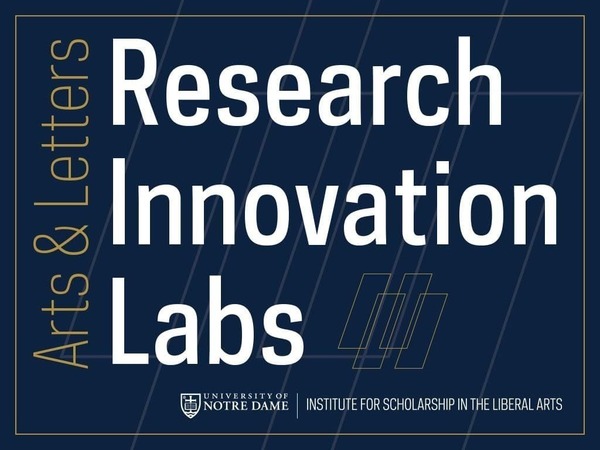
The University of Notre Dame College of Arts & Letters and Institute for Scholarship in the Liberal Arts (ISLA) have selected five research proposals that will foster innovation, encourage interdisciplinary research, and answer the world’s most crucial questions to comprise its inaugural group of Research Innovation Labs.
The University’s strategic framework placed a strong emphasis on integrative work and Arts & Letters leadership created these labs to encourage faculty to conduct thought-provoking research across disciplines. The labs will take two forms — the Humanities Research Labs and Strategic Theme Labs.
“These winning proposals exemplify how cross-disciplinary research can have lasting impact,” said Sarah Mustillo, the I.A. O’Shaughnessy Dean of the College of Arts & Letters. “I am so excited to foster this thoughtful work and continue our commitment to support faculty who tackle big questions and aim to address fundamental issues.”
The Humanities Research Labs will allow researchers to ask “big questions” as they pertain to subjects such as Africana studies, American studies, history, liberal studies, philosophy, and theology.
The 2024 Humanities Research Labs include:
- Pamela Butler, associate director of the Gender Studies Program, and Anna Haskins, the Andrew V. Tackes Associate Professor of Sociology and associate director of Notre Dame's Initiative on Race and Resilience, will create the Carceral Studies Research Lab. The lab will bring together Notre Dame researchers who study, teach, and work with community organizations related to policing, surveillance, and incarceration. A goal of the project is to go beyond the University and “transform all of our research, in collaboration with off-campus practitioners and partners whose work is already transforming our communities.”
- Katherine Walden, assistant teaching professor in the Department of American Studies, and Clinton Carlson, the Robert P. Sedlack Jr. Associate Professor of Design, will research the impact of the Foundry Field project — a collaborative community project that created a new South Bend public-access baseball field in Southeast Park that honors the Foundry Giants, a team of Black players who worked in the Studebaker Foundry in the 1920s and 1930s. In their Foundry Field: Baseball, History & Community in South Bend Lab, Walden and Carlson said their lab exists “in dialogue with local and regional history, using the physical field site and public art as a starting point to foster greater engagement with historical and contemporary issues of race, representation, and access in South Bend.”
The Strategic Theme Labs will aim to answer questions that align with the University’s campuswide strategic themes of poverty, democracy, and ethics.
The 2024 Strategic Theme Labs include:
- Thomas Stapleford, associate professor in the Program of Liberal Studies, and Patrick Gamez, assistant teaching professor and director of the A&L Dual Degree Program in the John J. Reilly Center for Science, Technology, and Values, will examine the impact of artificial intelligence (AI), specifically large language models like ChatGPT, on the humanities. For their Generative AI for the Humanities Lab, the researchers plan to “treat generative AI, pragmatically and heuristically, as an agent, and to employ the methods of the humanities in particular to understand its agential nature.”
- Christina Wolbrecht, professor of political science and the C. Robert and Margaret Hanley Family Director of the Notre Dame Washington Program, and Lakshmi Iyer, professor of economics and global affairs, will form the Representation of Women Lab, to “advance the understanding of the causes and consequences of women’s representation and activism, with a particular focus on the factors that encourage or discourage women from entering politics.”
- Jaimie Bleck, associate professor of political science, and Bernard Forjwuor, assistant professor of Africana studies, will create the African Governance Innovations Lab, in which they will research — with an interdisciplinary perspective — the historical periods, cultural movements, and philosophical thoughts that have contributed to the decline of democracy in Africa.
Kate Marshall, associate dean for research and strategic initiatives and director of ISLA, said they received a broad range of applications from scholars across the college who proposed transformative work both in and across their disciplines.
“The inaugural year of the Research Innovation Labs competition has been outstanding,” she said.
Proposals were evaluated on four criteria — interdisciplinarity, collaboration, excellence, and impact. Marshall said the successful applicants demonstrated how their approach will ignite new conversations across campus and have an impact on the surrounding community.
Each research lab will last for two consecutive years, and the lead faculty will be awarded two-course releases, a $15,000 grant per year, and access to a new Project Studio space in the ISLA office located on the third floor of O’Shaughnessy Hall.
“We can't wait to help get all of these projects going and look forward to next year's cycle,” said Marshall. “This program is a terrific showcase for transformative research in the college.”
Originally published by at al.nd.edu on April 04, 2024.